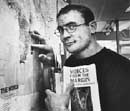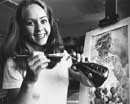By Clint Kelly
Photos by
Jerry Gay

Because
of the cross-disciplinary nature of the University Scholars program,
Christian
education graduate Josh Adams believes he actually received a degree
in
what he likes to call "inter-cultural relations."

Science meets artistic expression: Biochemistry graduate Heather
Tauschek
completed an internship in molecular parisitology and integrated her
watercolor
originals into her senior honors project.

For some of Seattle Pacific University's finest students, the study of the past becomes a catalyst for their future.
"Action informed by historical understanding" is the goal of the University Scholars, a Common Curriculum option for high achievers. A "great works" honors program, it attracts unusually serious and academically able students who typically apply their integrated knowledge of history, church and society in highly innovative ways.
Peter Venable, a 1997 SPU computer science graduate, is in the doctoral program in computer science at Carnegie Mellon University and may one day provide computer support for Bible translators. Because of his work in cross-lingual information retrieval, he was invited to Microsoft to address the speech recognition and language modeling group.
Sam and Candace Vance, theatre majors and graduates of 1995 and 1996, are on a teaching and performing tour of Spain. Currently in the process of founding a theatre and conservatory, the Vances are part of a Spanish national touring production of Romeo and Juliet.
Several groups of 1999 graduates are using their business and computer acumen to support youth ministry and disadvantaged school districts. In fact, nearly half the senior honors projects in 1999 dealt with missiology and related ethical issues, indicating a strong concern for community and global outreach.
University Scholars are consistently named President's Citation winners at graduation, including two of the three highest academic achievers honored at this year's ceremonies. Many go on to prestigious graduate schools, medical schools and law schools.
"Despite the rarified accomplishments of these students, this is not an elite program," says Janet Blumberg, professor of English and director of University Scholars. "We seek students with a special calling: to study the most challenging ideas of past and contemporary cultures, and to integrate those ideas with a passion for serving Christ in the world."
"In an ideal world, everyone would engage society at this level," says University Scholar Josh Adam, who this year narrowly missed selection for a Rhodes Scholarship. "The reality is that God doesn't call everyone to the life of a scholar."
A Christian education major, Adam sees his future role as that of a missionary or peace mediator. What is most certain is that because of his scholarly pursuits, he says he's "ready to engage with not just my society, but with 'world society.'"
A share of the credit for his readiness is due to the University Scholars' special cross-disciplinary approach. Adam says he studied history from the ancients to Emilio Zappata; religion from the Greek pantheon to modern Christianity; and psychology from adolescent development to cross-cultural interaction. He also explored science, art and mathematics. In short, says Adam, University Scholars was a stretching experience in knowledge integration.
For 1999 graduate Heather Tauschek, the program taught her to understand others on their own terms "and to realize that I view the world through a lens uniquely my own, shaped by my culture, experiences and personality."
It was an intellectual dawning that she says will prove valuable as she applies for medical school and studies to become a surgeon among underserved populations. Tauschek, a biochemistry major with a 3.98 GPA, was selected one of three President's Citation winners this June.
Central to the University Scholars' approach to learning is exposure to a broad spectrum of faith traditions around the world and across the ages. For some, the challenge to fundamental beliefs that arises in the process is a stimulating, faith-affirming exercise, although not without its abrasions.
"The Scholars program does not merely justify what one believes as a Christian," Adam says. "Indeed, it complicates the matter, often to the point of frustration. But a few frustrated Christians who have begun to think critically about their faith are sure to provide a legacy of deeper, wiser faith."
For other students, the close examination can be something of a rude awakening. "I have both gained and lost something," explains Tauschek. "I have gained an ability to think critically, to be a deeply thoughtful Christian ... but I have also lost much of the freshness of my faith."
For 1999 graduate Jim Bowman, a religious studies major with plans for graduate school, the genius of the University Scholars program is that faith is decompartmentalized.
"Faith and reason are not set side by side," he says. "They are integrated, synthesized, assumed to be one and the same thing.... Faith is not the absence of reason. Faith is that which allows reason to flourish."
![]()

| Please
read our
disclaimer.
Send any questions, comments or correspondence about Response to
jgilnett@spu.edu or call 206-281-2051. Copyright © 1999 University Communications, Seattle Pacific University.
Seattle Pacific University |